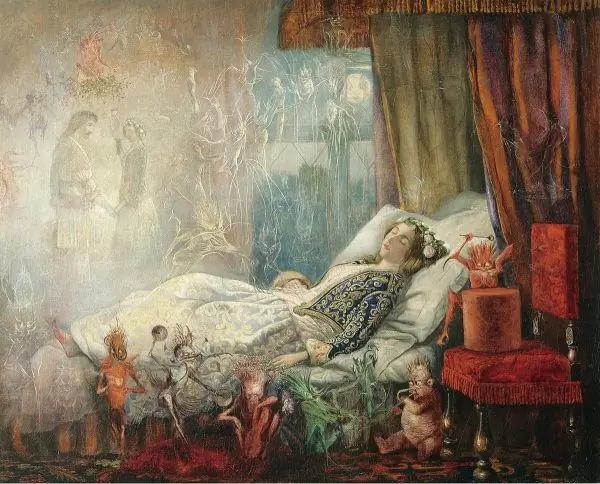
Table of contents:
- Author Bailey Albertson albertson@usefultipsdiy.com.
- Public 2023-12-17 12:53.
- Last modified 2025-06-01 07:32.
Long sleep is dangerous - why do scientists advise against sleeping more than normal?

All our lives we are told that not getting enough sleep is harmful. 8 hours of healthy and satisfying sleep is served as ideal for all people. But what about the other side of the coin? Why is there so little information in the media about overly long sleep? Let's try to fill this small gap.
Why a lot of sleep is more harmful than not getting enough sleep
In 2015, scientists from the University of Massachusetts decided to analyze statistics regarding sleep disorders and their impact on human health and mortality. The university staff did a great job - they processed dozens of already available studies, in which a total of more than 2 million people took part. Research has focused on the relationship between mortality and average sleep per night. A clear parabolic graph (in the shape of the letter U) became apparent, which said - if a person sleeps too little, this indicates a high risk of early death, but excessively long sleep also suggests the same thing.
Elizabeth DeVore, who observed and interviewed a group of volunteers for 14 years (from 1986 to 2000), came to similar results. Women in this experiment adhered to different daily regimes - one group slept for 6 hours or less, the second adhered to the generally accepted norm of 7-8 hours, and the third chose a longer sleep - 9 or more hours. According to Devore's results, the first and third groups were much more likely to complain of problems with memory, concentration and performance. Moreover, the intensity of complaints of the third group was higher than that of the first, which means that people who sleep too much experience the same problems as those who do not sleep enough, but much brighter.

Sleeping too long is just as dangerous as not getting enough sleep.
Does this mean that a lot of sleep is harmful? Or is long sleep just a symptom of diseases that can lead to early death? Both statements are true. Scientists say that with a sleep duration of 9 hours or more, its quality is impaired - which leads to impaired cognitive functions. But sometimes a long sleep is not a cause, but a consequence of a disease.
What a long dream can talk about
Excessive sleepiness and prolonged sleep for 10 hours or more are very vague symptoms that can indicate a variety of disorders. The most harmless of them is simple fatigue, which is treated by adjusting your business, changing jobs and taking less responsibility. But there are frequent cases of more serious diseases that provoke excessively long sleep:
- viral infections. Have you noticed how during the flu or SARS the body constantly falls asleep, and the night's rest itself often lasts 10-12 hours? This is a normal condition for viral infection;
- depression and anxiety disorders. Unfortunately, it is very difficult to diagnose depression, especially in Russia, where the attitude towards mental disorders is still very ambiguous. However, depressive disorders and an increased sense of anxiety can provoke drowsiness and an increased duration of night rest. The prevailing theory regarding this symptom is that in this way the body tries to hide from a reality that causes many negative sensations;
- endocrine disorders - for example, with insufficient production of hormones by the thyroid gland;
- other diseases that cause hormonal disruptions;
- chronic fatigue syndrome. This disease is caused by excessive emotional and intellectual stress. In addition to prolonged sleep, he has a number of symptoms, including an unreasonably bad mood, susceptibility to infectious diseases, inflamed lymph nodes in the axillary and cervical zones. This syndrome can be determined by a neurologist.

Many of these diseases are caused by an inadequate pace of life - are you working too hard?
How much sleep do you need
The lowest point of the plot of mortality versus sleep duration, the apex of the parabola, is located at the 7-hour sleep level. This means that it is this length of weekly rest that is recommended to reduce the risk of early mortality. However, this graph does not account for age and hormonal differences. Therefore, scientists make a separate note about how much it is recommended to sleep for different people:
- children under 12 are recommended to sleep 9-10 hours a day;
- during puberty (average 12-18 years), night rest should be reduced to 6-7 hours;
- young people under 35 are advised to sleep 7-8 hours;
- mature citizens over 35 should stay in bed for 8-9 hours;
- and people from 55 and older can again, as in their youth, sleep for 6-7 hours.
What do scientists think about weekly sleep deprivation, which is offset by 10 hours of sleep on the weekend? In fact, rather negative. Most studies indicate that "getting enough sleep" can only be done within two days of not getting enough sleep. Therefore, even if you cannot sleep well during the week, it is better to try to adhere to the above norm on weekends.
How to get to sleep
If a long sleep is not a symptom of any disease, then you can adjust the regimen on your own to avoid the impairment of memory and other cognitive functions, which Elizabeth Devore writes about in her study. Here are some tips to help improve sleep quality and shorten sleep:
- give up TV, computer and smartphone at least two hours before bed. Before going to bed, you need to do something that does not overload your brain and does not cause an adrenaline rush. Therefore, the best occupation is reading light novels (not action-packed detective stories, and certainly not depressive decadent works);
- do not eat heavy foods three hours before bedtime. Ideally, you should give up food altogether, using only water. If you really want to eat, opt for a fresh vegetable salad rather than a cheese and sausage sandwich;
- if you like making plans for the next day, do it during the day. In the evening, do not bother with tomorrow's difficulties - this can result in disturbing thoughts before going to bed, which will greatly spoil its quality;
- skip alcohol at dinner and just before bed. A small dose of alcohol helps to fall asleep faster, but it does not affect the quality of sleep in the best way;
- include at least 40 minutes of exercise in your daily schedule. Just make sure you exercise no later than two hours before bed;
- ventilate the room before bed. The bedroom should be cool;
- make sure the room is dark and quiet enough. Turn off all noisy equipment, retract blackout curtains, or, if this is not possible, use a sleep mask and earplugs.

Sleep masks can be not only useful, but also a beautiful accessory.
Too long sleep is not a normal state of the body, but a pathology that can lead to unpleasant consequences or be a symptom of even less pleasant diseases. You should try to establish a sleep routine, and if you have difficulties with this, consult a doctor for diagnosis.
Recommended:
Why Do Cats Bite When You Stroke Them, And Just Like That?

Why do cats bite when you stroke them. Why do cats just bite?
Why You Can Not Tickle Young Children, How Tickling Is Dangerous

What is the danger of prolonged tickling, especially at an early age? What consequences can it lead to? Video. Feedback
People Who Do Not Sleep At All - The Phenomena Of Human Sleep

Are there people who never sleep. How they feel. History, study of the phenomenon
Why Late Sleep Is Dangerous - Negative Consequences For A Person

Why you need to go to bed before 23:00. Dangers of late sleep. How to train yourself to go to bed earlier
Is It Possible To Sleep With A Tampon All Night, How Dangerous Is It

Is it possible to sleep all night with a tampon all night. What are the consequences. Women's stories
